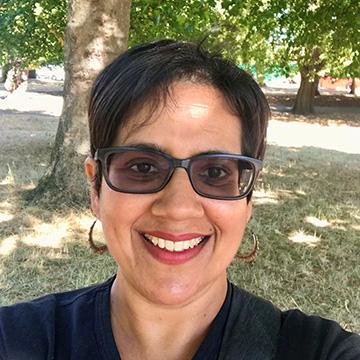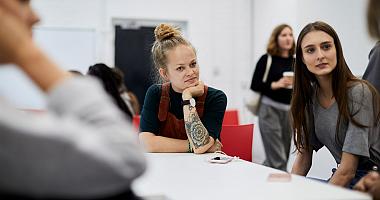BA (Hons)
Anthropology
Content navigation menu
Why study BA Anthropology at Goldsmiths
On this degree you'll explore anthropology from fresh, contemporary perspectives.
- You'll investigate the world of anthropology from a new angle, drawing on interdisciplinary perspectives to approach issues such as the environment, the state, its politics towards refugees and asylum seekers.
- The BA Anthropology degree offers a challenging and contemporary syllabus. You'll explore key anthropological debates and use them to help you understand contemporary societal and cultural issues.
- We offer a fresher approach to the subject than other universities – from the impact of the environmental crisis and austerity economics, to border politics, the state and racism, you’ll learn much more than just ‘traditional’ anthropology. This is one of the reasons we were ranked top 10 in the UK for anthropology in the QS World University Rankings by Subject in 2023.
- In the first two years, you’ll concentrate on contemporary anthropological approaches and concepts, such as kinship, ritual, critical ecologies, and intersectionality. You'll also learn to analyse these concepts using video, film and written texts, and you’ll get to study about different regions of the world in depth.
- You'll also hone your anthropological skills by choosing from a selection of optional modules, tailoring your degree to your own interests, aspirations and future employability.
- You'll explore links between theoretical issues and ethnographic studies, enabling you to think critically about culture and society in Britain, and around the world.
- Our graduates have gone on to work for the UN, World Bank, NGOs, law companies and corporate social responsibility (CSR) consultancies.
Contact the department
If you have specific questions about the degree, contact Dr Kuldip Kaur or Dr Julia Sauma.
UCAS code
L602
Entry requirements
A-level: BBB
BTEC: DDM
IB: 33 points overall with Three HL subjects at 655
Length
3 years full-time or 4-6 years part-time
Fees
Home - full-time: £9250
Home - part-time: £4625
International - full-time: £20160
Department
Watch videos about your course
What you'll study
Year 1 (credit level 4)
Compulsory modules
You'll take the following compulsory modules:
| Module title | Credits |
|---|---|
| Being Related | 15 credits |
| Approaches to Contemporary Anthropology | 30 credits |
| Ethnographic Film | 15 credits |
| Academic Skills for Anthropology | 15 credits |
| Anthropology in London | 15 credits |
| Anthropological Ideas Today | 15 credits |
Note about optional modules (if available): The above is indicative of the typical modules offered, but is not intended to be construed or relied on as a definitive list of what might be available in any given year. The module content and availability is subject to change.
Teaching style
This programme is taught through scheduled learning – for example, through a mixture of lectures, seminars and workshops. You'll also be expected to undertake a significant amount of independent study. This includes carrying out required and additional reading, preparing topics for discussion, and producing essays or project work.
How you'll be assessed
You’ll be assessed by a variety of methods, depending on your module choices. These may include coursework, examinations, group work and projects.
Credits and levels of learning
An undergraduate honours degree is made up of 360 credits – 120 at Level 4, 120 at Level 5 and 120 at Level 6. If you are a full-time student, you will usually take Level 4 modules in the first year, Level 5 in the second, and Level 6 modules in your final year.
Careers
Our BA Anthropology graduates have been successful in a range of areas, including:
- Filmmaking
- Advocacy work for NGOs and development agencies
- Journalism
- Museum curating
- Media careers
- Teaching
- Postgraduate research
Our particular emphasis on public anthropology encourages our students to explore options in a range of practice-based and public sector career paths.
Find out more about the types of jobs you can get with an anthropology degree.
Skills
The BA Anthropology degree will equip you with a range of specialist and transferable skills. As part of your studies, seminars and course work, you'll develop skills in:
- Analytical thinking
- Communication (including public speaking, developing and presenting an argument, note taking, report writing)
- Awareness of social and cultural differences
- Understanding human behaviour
- Thinking 'outside the box'
- Research and evaluation
- Open mindedness
What our students say

Entry requirements
We accept the following qualifications:
A-level: BBB
BTEC: DDM
International Baccalaureate: 33 points overall with Three HL subjects at 655
Access: Pass with 45 Level 3 credits including 30 Distinctions and a number of merits/passes in subject-specific modules
Scottish qualifications: BBBBC (Higher) or BBC (Advanced Higher)
European Baccalaureate: 75%
Irish Leaving Certificate: H2 H2 H2 H2
We don't assume you have any knowledge of anthropology, and welcome applications from anyone with arts, social studies or science backgrounds.
Alternative qualifications and experience
See our full list of undergraduate entry qualifications.
We welcome students with a range of educational experiences. If you believe you may not meet the standard qualification requirements we would still encourage you to apply because we consider all aspects of your application when making a decision.
We’ll pay particularly careful attention to your personal statement, which is your opportunity to demonstrate your interest in the subject you’ve applied for. Your referees are also welcome to include any relevant contextual comments around your academic achievements. We’ll look at all these things when making a decision on your application, as well as your qualifications and grades, and may still be able to offer you a place.
International qualifications
We also accept a wide range of international qualifications. Find out more about the qualifications we accept from around the world.
If English isn’t your first language, you will need an IELTS score (or equivalent English language qualification) of 6.0 with a 6.0 in writing and no element lower than 5.5 to study this programme. If you need assistance with your English language, we offer a range of courses that can help prepare you for degree-level study.
Fees and funding
Annual tuition fees
These are the UG fees for students starting their programme in the 2024/2025 academic year.
- Home - full-time: £9250
- Home - part-time: £4625
- International - full-time: £20160
If your fees are not listed here, please check our undergraduate fees guidance or contact the Fees Office, who can also advise you about how to pay your fees.
It’s not currently possible for international students to study part-time if you require a Student Visa, however this is currently being reviewed and will be confirmed in the new year. Please read our visa guidance in the interim for more information. If you think you might be eligible to study part-time while being on another visa type, please contact our Admissions Team for more information.
If you are looking to pay your fees please see our guide to making a payment.
Funding opportunities
We offer a wide range of scholarships and bursaries, and our Careers Service can also offer advice on finding work during your studies. Find out more about funding your studies with us.
Additional costs
In addition to your tuition fees, you'll be responsible for any additional costs associated with your course, such as buying stationery and paying for photocopying. You can find out more about what you need to budget for on our study costs page.
There may also be specific additional costs associated with your programme. This can include things like paying for field trips or specialist materials for your assignments. Please check the programme specification for more information.






